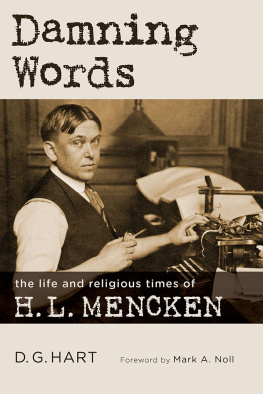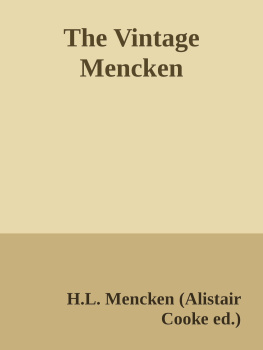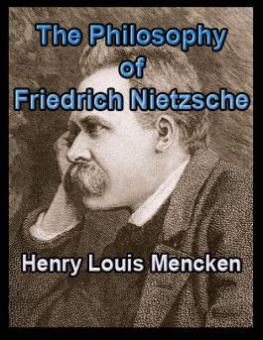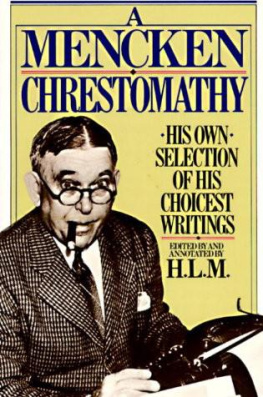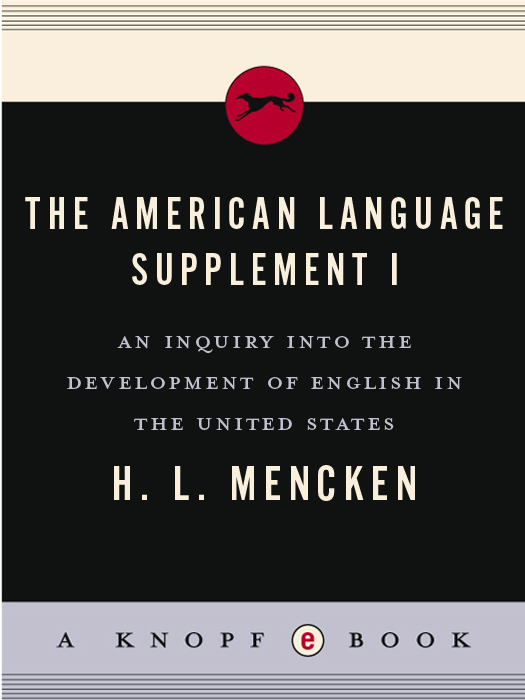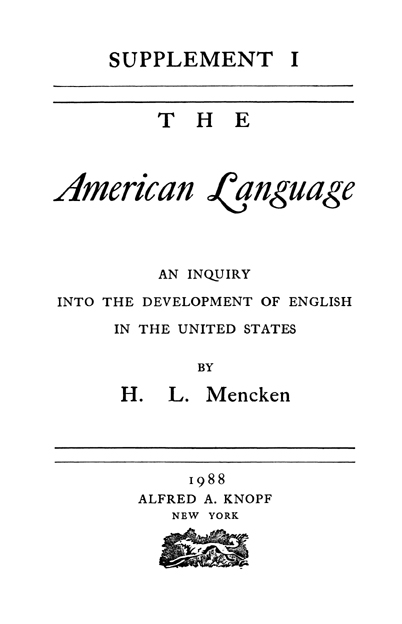BOOKS BY H L MENCKEN

THE AMERICAN LANGUAGE
THE AMERICAN LANGUAGE: Supplement I
THE AMERICAN LANGUAGE: Supplement II
HAPPY DAYS
NEWSPAPER DAYS
HEATHEN DAYS |  | which taken together constitute
The Days of H. L. Mencken |
A NEW DICTIONARY OF QUOTATIONS
TREATISE ON THE GODS
CHRISTMAS STORY
A MENCKEN CHRESTOMATHY (with selections from the Prejudices series, A Book of Burlesques, In Defense of Women, Notes on Democracy, Making a President, A Book of Calumny, Treatise on Right and Wrong, with pieces from the American Mercury, Smart Set, and the Baltimore Evening Sun, and some previously unpublished notes)
MINORITY REPORT: H. L. MENCKENS NOTEBOOKS
THE BATHTUB HOAX and Other Blasts and Bravos from the Chicago Tribune
LETTERS OF H. L. MENCKEN, selected and annotated by Guy J. Forgue
H. L. MENCKEN ON MUSIC, edited by Louis Cheslock
THE AMERICAN LANGUAGE: The Fourth Edition and the Two Supplements, abridged, with annotations and new material, by Raven I. McDavid, Jr., with the assistance of David W. Maurer
H. L. MENCKEN: THE AMERICAN SCENE, A READER , selected and edited, with an introduction and commentary, by Huntington Cairns
These are BORZOI BOOKS, published by ALFRED A. KNOPF in New York


COPYRIGHT 1945 by Alfred A. Knopf, Inc. All rights reserved. No part of this book may be reproduced in any form without permission in writing from, the publisher, except by a reviewer who may quote brief passages in a review to be printed in a magazine or newspaper. Published in Canada by Random House of Canada, Limited.
eISBN: 978-0-307-80878-3
v3.1
PREFACE
Since the fourth edition of The American Language was published in April, 1936, it has been reprinted eight times (not to mention an English edition and one in Braille, in fourteen volumes, for the use of the blind), and in consequence I have had a chance to correct some of the more embarrassing errors in the earlier printings; but the size of the volume has made it impracticable to attempt any considerable addition of new matter, and in consequence there is a formidable arrearage of material awaiting working up. It has poured in from numerous and varied sources. For one thing, there has been a sharp increase in the professional literature of the subject, culminating in the launching in 1939 of the monumental Linguistic Atlas of the United States and Canada, and the completion in 1944 of A Dictionary of American English on Historical Principles, which was barely getting under way when my fourth edition was published. Meanwhile, the publication of the third volume of Richard H. Thorntons American Glossary (the first two volumes had appeared in 1912) was finished in Dialect Notes in 1939, and that intermittent journal and the more regular American Speech (begun in 1925) continued to print many valuable papers on American speechways, laid under heavy contribution here. Nor was all the work of exploration and mapping done by Americans, for in 1939 H. W. Horwill brought out at Oxford his Anglo-American Interpreter, the first attempt at an English-American dictionary on a comprehensive scale, and Eric Partridge continued his studies of English borrowings of American slang. In the latter field the American, W. J. Burke, published an excellent bibliography in 1939, under the title of The Literature of Slang, and Lester V. Berrey and Melvin Van den Bark followed in 1942 with The American Thesaurus of Slang, which went far beyond the late Maurice H. Weseens Dictionary of American Slang of 1934. There appeared also a number of books dealing with various other special phases of the subject for example, Robert L. Ramsay and Frances Guthrie Embersons Mark Twain Lexicon in 1938, Satoshi Ichiyas Kings English or Presidents English in 1939, Charles Carpenter Friess American English Grammar in 1940, Colonel Elbridge Colbys Army Talk in 1942, and Harold Wentworths American Dialect Dictionary in 1944.
I have given diligent study to all this literature, and in addition have accumulated a large body of observations from other sources. Ever since the publication of my first edition in 1919 I have had clipping bureaus supply me with everything printed on the subject in the newspapers of the United States, Great Britain and the British dominions and colonies, and until the outbreak of World War II my gleanings also included many contributions from non-English-speaking countries, especially Germany and Japan. Finally, I have been in constant correspondence with interested persons, many of them professional philologians but most of them lay inquirers like myself, in all parts of the world, and from them I have received a great deal of extremely useful matter, most of it unprinted. Not a few excellent suggestions have come from blind readers of the Braille edition before mentioned. I have given credit to all these helpers at appropriate places in the text, but to some I owe debts so heavy that they should be mentioned again here for example, to Dr. Louise Pound of the University of Nebraska, whose early work put the study of current American English on its legs, and whose interest in my book has been of fundamental value at all of its stages; to the Right Rev. J. B. Dudek, chancellor of the Roman Catholic diocese of Oklahoma City and Tulsa, whose wide learning includes a mass of philological knowledge that he has been generous enough, at every turn, to place at my disposal; to Allen Walker Read, late of the staff of A Dictionary of American English, from whose invaluable investigations of the history of the language I have borrowed often and copiously; to Fred Hamann of Pekin, Ill., who turned over to me a large body of very useful material, otherwise unobtainable; to Don Bloch of the United States Fish and Wildlife Service, Department of the Interior, for many contributions of the same sort; to P. E. Cleator of Wallasey (Cheshire), who has favored me with many clippings missed by the English clipping bureaus, and has otherwise lent a sturdy hand to my labors; to my old friend H. W. Seaman of Norwich, an English journalist of extensive American experience, a diligent and perspicacious student of the popular speech of both countries, and hence my constant (and amiably willing) referee on questions of disputed usage; to Professor D. W. Brogan of Cambridge University, another Briton with a wide and deep knowledge of American speechways; to Dr. Joseph M. Carrire of the University of Virginia, who has led me to sources that Id certainly have missed without his open-handed aid; to Dr. Atcheson L. Hench of the same university, who has made me free of his large and valuable accumulations and given me generous help otherwise; and to the late F. H. Tyson of Hong Kong, who began to send me a steady stream of useful material (largely from the English colonial papers) in 1923, and whose widow, after his lamented death in 1942, made me a present of his extraordinarily rich collection. I am indebted too to the editors and publishers of A Dictionary of American English, Websters New International,


